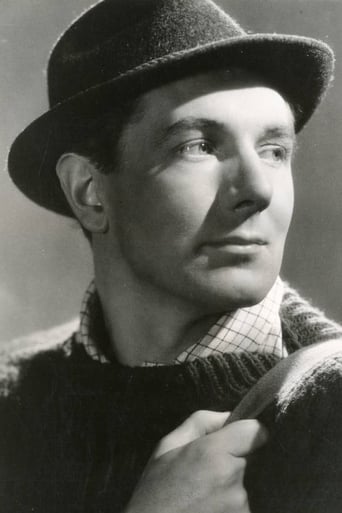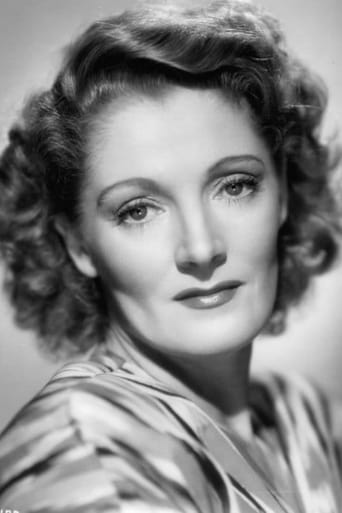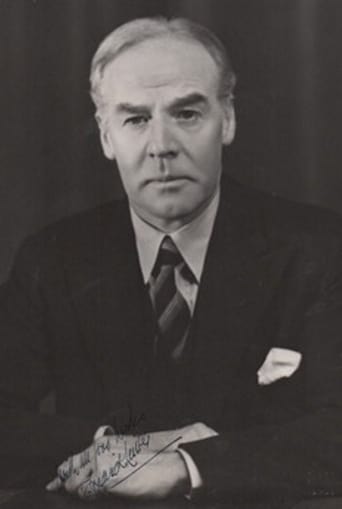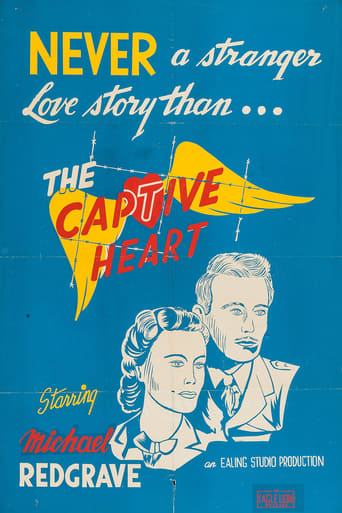
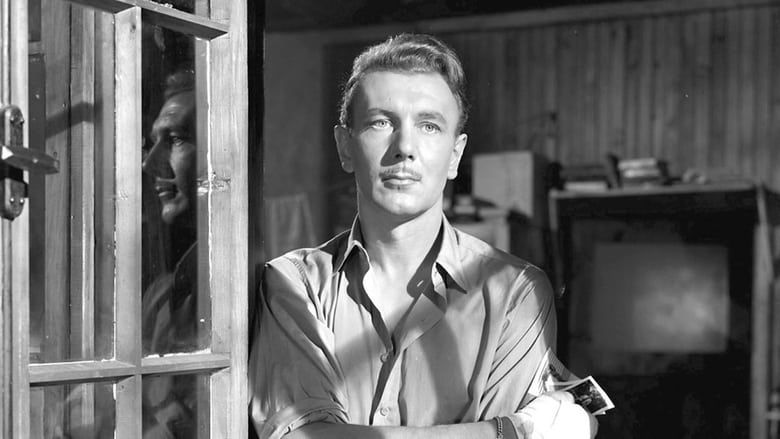
The Captive Heart (1946)
A series of stories about the lives and loves of nine men in a Prisoner of War Camp over five years. Location shooting in the British occupied part of Germany adds believability. The main story is of Hasek (Redgrave) a Czech soldier who needs to keep his identity a secret from the Nazis, to do this he poses as a dead English Officer and corresponds with the man's wife. Upon liberation they meet and decide to continue their lives together. The other inmates' stories are revealed episodically.
Watch Trailer
Cast
Reviews
You won't be disappointed!
Sick Product of a Sick System
Good films always raise compelling questions, whether the format is fiction or documentary fact.
This film is so real. It treats its characters with so much care and sensitivity.
Having assumed the identity of a deceased British soldier to avoid being sent to back to a concentration camp, a Czech civilian winds up at a prisoner-of-war camp where he must convince his suspicious inmates that he is not a German mole in this Ealing Studios drama. Often regarded as the first World War II P.O.W. movie, filmed in actual German locations, 'The Captive Heart' has a lot of interest to it. The screenplay is not without its flaws. The protagonist convinces the Brits of his true identity a little too quickly for credibility. There are also far too many subplots in the mix, with only Gordon Jackson as a blinded officer of any interest; the rest of the characters are bland and the episodic structure subtracts from the immediacy of the protagonist's ordeal. Michael Redgrave is superb in the lead role though with everything he has to endure, even allowing his hand to be smashed in a heart-wrenching scene in order to be able to explain the difference in his handwriting when writing letters to the wife of the soldier whose identity he took. In fact, this one of the major narrative strands of the movie with personal identity issues briefly arising as Redgrave finds that he has to fake correspondence "home" to avoid the Germans catching onto his real identity. Add in some luscious, mobile cinematography from Douglas Slocombe (note the gradual zooms-in as Jackson's bandages are removed and the exterior shots that track and pan over the soldiers at attention) and 'The Captive Heart' is a film with a lot to like about it, imperfect as it may be.
This is an immensely sensitive and very moving film about British POWs rounded up by the Germans at Dunkerque (Dunkirk) in 1940 and marched 220 miles to be interned for the rest of the War in a German POW camp. The film is half about them and half about their lives and loves back home, utilising flashbacks as well as real time events intercut with the men in the camp. The technique is carried out so well that it is highly effective and never seems forced. Much of the film was made in Germany, including the reconstruction of the POW camp. The film aimed for absolute authenticity, and was made with the passion and intensity which was perhaps only possible in the year immediately following the War, when all the issues raised were at their peak of relevance, both to the people making the film and the viewing public. The film is full of wonderful, sensitive and deeply-felt performances. They all really put their hearts into it, and it shows. For instance, rarely can the character actor Mervyn John have embodied such pathos. And the intensity of emotion conveyed by both Rachel Kempson and Jane Barrett is remarkable. Barrett died tragically young at the age of only 46, in 1969, having worked a great deal in television but never obtained the quality roles worthy of her in feature films. Thus she is little known today, but this film shows her qualities admirably. This was one of director Basil Dearden's finest films. He made it immediately after his two episodes of DEAD OF NIGHT (1946), and three years later he directed two episodes of the wonderful classic, TRAIN OF EVENTS (1949, see my review), one of which also dealt with prisoners of war. (The ironical thing is that Dearden made films all through the War and was not in the services, so had no military experience.) It is apparently in this film that Dearden's long professional association with Michael Relph commenced. Relph was both Associate Producer and Art Director on this film. Later he would produce most of Dearden's films. The lead role in this film is played by Michael Redgrave. He had already been married to Rachel Kempson for eleven years when they played in this film together. Redgrave plays a Czech soldier who has escaped from Dachau and is being hunted by the Germans. He speaks perfect English and indeed has been Professor of English at Prague University. He comes across the dead body of Captain Geoffrey Mitchell, a British officer, and takes his identity and uniform, is captured by the Germans and sent to the POW camp as an Englishman. The real Mitchell had been estranged from his wife (played by Rachel Kempson). Redgrave is forced to engage in correspondence with his 'wife' in order to convince the Germans that he is not an impostor. He smashes his right hand so that he is forced to write with his left, as a way of excusing the change of hand-writing to his 'wife'. They then exchange increasingly passionate letters to one another over the years, leading to an awkward situation when the War finally nears its end and Redgrave is 'repatriated' to England as Captain Mitchell. There are wonderful character parts for Gordon Jackson, Jack Warner, Gladys Henson, and others. Derek Bond is excellent as a sensitive concert pianist, Lieutenant Harley. The following year he was to make a big hit as Nicholas Nickleby in the film of that (1947). He never achieved lasting star status, and died as recently as 2006 after appearing in 67 titles. This film, done with such passion and integrity, is a classic of the time, and makes compulsive viewing today considering what it conveys of historical importance, of the manners, situations, and modes of feeling of that period.
The old saying if you're going to steal, steal from the best rings true in this case which is essentially In Which We Serve in khaki; both feature men in confined spaces reminiscing about their lives in Civvy Street with the main difference being that instead of a lifeboat we have a prison camp where a similar cross-section of Upper, Middle and Working Classes learn to rub along more or less amicably. For good measure they even ripped off the celebrated scene from Casablanca where the German singing is drowned out by 1) the Marseillaise and 2) Roll Out The Barrel, but the most blatant rip-off from the Coward masterpiece is in the two married couples, respectively Bernand Miles/ Joyce Carey/ John Mills/Kay Walsh and Jack Warner/Gladys Henson/Mervyn Johns/Rachel Thomas, who were friends before the war so much so that the two wives move in together for the duration; in each film one wife is killed and the news is broken to the widower via a letter from home to the other man so here Jack Warner gets to tell Mervyn Johns that Rachel Thomas is dead. This to one side The Captive Heart remains a compelling film because at its heart (sorry about that) is the wonderfully low-key love story between Michael Redgrave and his real-life wife Rachel Kempson of which 95 per cent is played out via under-stated letters which only mention love between the lines. The support is largely sound and trivia buffs will be interested to note that two years earlier (1944) Meriel Forbes had married Ralph Richardson so that the film boasted the real-life wives of two future theatrical knights. One to buy on DVD.
Great plot, excellently under-stated performances, writing and direction. The fact that this film was made in 1946, so close to the events its depicts, seems to add an almost documentary-like quality to this film. Indeed, in the opening credits, the line 'Filmed in the British Zone of Western Germany' suggest that the realistic prison-camp scenes were probably shot in genuine locations. The cast is almost a repertory company of British 1940s actors - but no-one is taking an easy ride. There are fresh and challenging performances, even though the faces are familiar. What struck me is how the film is free of the gung-ho 'smart prisoners, dumb Krauts' type of prison camp film that dominated the genre later on. This film is the product of a people tired of war. At the same time, it retains some of the stiff upper lip feel of many British wartime films, but with the confidence of victory, it does not need to indulge in the 'beastly Hun' elements. Moving without being sentimental. A very 'human' film, only a few steps short of a masterpiece.
